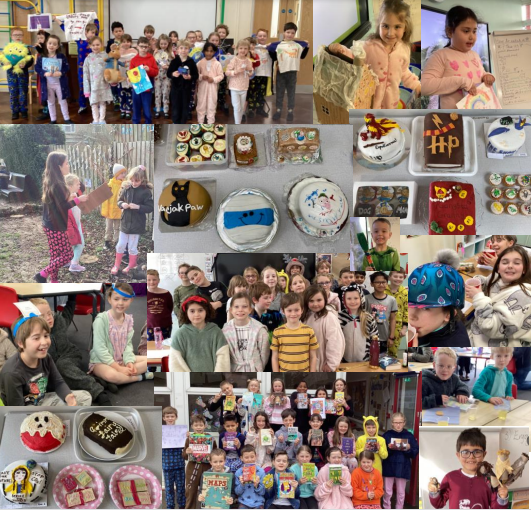At English Martyrs CVA we believe in both the importance of developing children’s discrete word-reading skills and comprehension, and the need to engender their love of books and reading. We recognise that the two elements are intertwined; each relies on the other if children are to become life-long readers. Every child deserves the chance to become a reader and reading is a passport to the world. Reading great literature opens children up to ideas, experiences, places and times they might never otherwise experience in real life. Reading for pleasure gives opportunities to learn about a multitude of things that cannot be covered by a school curriculum, in a household where reading is not valued; school will be the key place where they come into contact with books.
All year one children take the ‘Phonics Screening Check’ – a statutory assessment required by legislation. The children have to read a total of 40 words and non words using their phonetic skills. The 40 words and non-words are divided into two sections – one with simple word structures of three or four letters, and one with more complex word structures of five or six letters. The teacher administering the check with your child will give them a few practice words to read first – including some non-words – so they understand more about what they have to do. Each of the non-words is presented with a picture of a monster / alien, as if the word were their name (and so your child doesn’t think the word is a mistake because it doesn’t make sense!).
Our Parent Phonic Screening Check information is available to read here.
Parents are informed of the outcome from the phonics screening check in end of year reports. Those who do not meet the pass mark will be given support and intervention programmes in year two to provide them with sufficient knowledge and understanding to re-take the ‘Phonics Screening Check’ and obtain a pass mark. Those children who do not obtain the required level set by the ‘Phonics Screening Check’ for a second time will access appropriate intervention detailed above.
Children in year 2 and above will be taught reading comprehension skills through a whole class approach using VIPERS in KS2 and a condensed version in year 2 once a week. The children will all be exposed to a variety of texts including fiction, non- fiction and poetry. All children will be encouraged to read aloud as part of this teaching as well as adults modelling reading during the lesson. Each lesson will always include introducing the children to a range of rich vocabulary as well as focusing on one of the VIPERS skills with an opportunity during the lesson for the children to answer written comprehension questions.
All children will have at least one individual reading book which have all been book banded to ensure that the book is matched to the reading age of the individual child.
All staff are aware of the importance of reading and realise that the curriculum can not be accessed appropriately by a child if they do not have the necessary reading skills. They are also aware of the importance of gaining knowledge from reading. We promote the importance of using books as a hook into a topic or theme for learning and we expect reading activities to be part of our whole curriculum embedded into all teaching.
We celebrate reading at school and at home. All children should read at least 3 times a week and this should be recoded in their reading diaries. The children are working hard to cross off numbers on their own personal 100 square to win prizes along the way and complete the 100 square as quickly as possible. Our pupil librarians also introduce reading competitions for the pupils to take part in.
Reading Intent
Following the national curriculum for Reading, our intent is that all our children will:

Head
- Develop appreciation of a range of authors.
- Develop the knowledge and skills linked to VIPERs.
- In EYFS and KS1 children will have phonics skills to decode unknown words.
- Read easily, fluently and with clear understanding.
- Acquire a wide range of vocabulary.

Heart
- Foster a love of reading through a range of genres and recognise the pleasure they can get from reading.
- Rich and varied learning opportunities to become confident in reading.
- Respect the range of opinions and representations found in books.
- Develop confidence to read aloud in a range of situations.

Hand
- Apply their reading skills across the curriculum not just their ability to decode but to comprehend what they are reading.
- Apply the wide range of vocabulary they will have acquired to speaking and writing.
- Apply the skills learnt in reading to enable children to know more, remember more and understand more to help them to reach and extend their potential in all curriculum subjects.
Implementation:
A clear and coherently planned curriculum underpinned by our school virtues, design principles , learning habits, our academic curriculum uses either the EYFS statutory framework or the National Curriculum as the basis for content and expectations. We have structured this so that each year group has:
- A clear list of year group objectives for all areas of learning which must be covered.
- A clear progression of skills and knowledge enabling curriculum coherence across the school.
- The teaching of phonics through a daily systematic synthetic phonics programme in EYFS, year 1 and 2 where applicable.
- Weekly whole class reading sessions (year 2 onwards) exposing children to a variety of non-fiction, fiction and poetry focusing on individual reading skills.
- Individual reading at home and in school celebrated through our school reading challenge.
- Opportunities across the curriculum to apply reading skills learnt.
- Attainment will be assessed each half term through differentiated reading assessments.
Impact:
- Most children will achieve age related expectations by the end of their cohort year.
- Children analysed as not achieving well enough are encouraged to become regular readers.
- Data from all assessments in Sept /Dec/March/ July is shared with senior leaders and next step decisions are considered and intervention strategies put into place to address any underachievement.
- As we believe that reading is key to all learning, the impact of our reading curriculum goes beyond the result of statutory assessments. Children have the opportunity to enter the wide and varied magical worlds that reading opens up to them. As they develop their own interest in books, a deep love of literature across a range of genres cultures and styles is enhanced.
- Most children will become fluent and confident readers who can apply their knowledge and experience to a range of texts through the Key Stage 2 curriculum.
- As a Year 6 reader, transitioning into secondary school, we aspire that children are fluent, confident and able readers, who can access a range of texts for pleasure and enjoyment, as well as use their reading skills to unlock learning and all areas of the curriculum. We firmly believe that reading is the key to all learning and so the impact of our reading curriculum goes beyond the results of the statutory assessments.
- The impact of our reading curriculum is that each child learns more, knows more and remembers more so that they reach their full potential through all curriculum areas
At English Martyrs we teach phonics through a daily systematic, synthetic phonics programme, Twinkl Phonics. We teach six different levels of phonics beginning with environmental sounds and then moving through a range of grapheme phoneme correspondences. Each level builds on the skills and knowledge of the previous learning. They are also taught to read and spell ‘tricky words’, which are words with spellings that are unusual or that children have not yet been taught. When they are
ready, children progress from books without words to simple stories with words and sounds.
Please take a look at our Phonics Powerpoint.
Please take a look at this useful leaflet on an introduction to Pie Corbett’s Reading Spine.
World Book Day 2022
We had a jam packed day for World Book Day! Children can come to school in their pyjamas, with their favourite book and a decorated item linked to their favourite story. We held a Great British Book Off and raised £122.50 in the raffle and cake sale for new books in the library. Children also did a book swap in their classes and enjoyed having family members in school to read with them.
The Reading Ambassadors organised a quiz for children to take part in, children played games and the whole school joined together to write a story!
World Book Day 2021
This year, we delayedour World Book day celebrations until all the children were back in school.
We had a great celebration – the children came into school in their pyjamas and enjoyed a special breakfast in their classrooms as well as some fun activities throughout
the day


